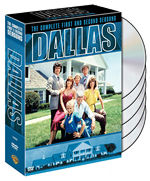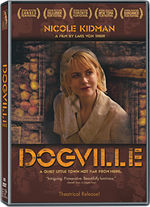Latest Software Reviews
 DVD: Dallas: The Complete First and Second Seasons—Warner Brothers
DVD: Dallas: The Complete First and Second Seasons—Warner BrothersVideo: 3
Audio: 2
Extras: 2
Dallas' premiere in 1978 helped to usher in a new television genre: the prime-time soap opera. It had been tried before, but the amazing success of Dallas spawned an instant wave of imitators. Flamingo Road, Falcon Crest, and Dynasty all soon hit the airwaves in an attempt to cash in on the craze. The attentive viewer will notice something similar about these shows: All of the characters are filthy rich. Yes, it seems that America loves to watch shows about miserable wealthy people. They say that money can't buy happiness, but I bet you'll have some trouble convincing Aaron Spelling of that fact.
Watching the first episodes of Dallas 25 years after its premiere, it's easy to see why the show was such a smash. Larry Hagman's J.R. is perhaps the greatest bastard in television history, and I mean that as a compliment. The guy would probably lock up his own wife in a sanitarium if it meant more money for his bank account—oh yeah, he did, didn't he? Patrick Duffy's Bobby was also a bit feistier in these early episodes, undoubtedly spurred on by the stunning Victoria Principal.
This five-DVD set contains all 29 episodes from the first and second seasons. The 1.33:1 picture and Dolby 2.0 sound are unfortunately average at best, and extras are limited to a few selected commentaries from Hagman and Charlene Tilton. As a true bonus, turn to episode four, in which Linda Grey's Sue Ellen performs "People Who Need People" wearing nothing but her Miss Texas sash. It is unquestionably the most disturbing five minutes of television I've ever seen.—Gary Maxwell
 DVD: Dogville–Lions Gate
DVD: Dogville–Lions Gate
Video: 2
Audio: 3
Extras: 2
Pitiful Grace (Nicole Kidman) arrives in a Depression-era mountain village and endures all manner of humiliation and torture on her way to a questionable redemption. In other words, it's a consummate (if sub-par) Lars Von Trier film. Each viewer is likely to discern their own interpretation of Dogville's copious symbolism and shifting ethical stance, ensuring a true love-it-or-hate-it viewing experience.
Staged like a play, with almost no props or structures, and shot on digital video, it's difficult to discern if Dogville is an intentionally crappy-looking artistic statement, a bad image transfer, or (and this would be my humble guess) both. Suffice it to say, this isn't a DVD you'll be using to show off your system. Muddiness and color bleeding abound in the 1.85:1 anamorphic video, and skin tones in particular crackle with a distracting, cranked-up rustiness. The Dolby Digital 5.1 soundtrack effectively conveys the cramped feel of the indoor soundstage on which the tale unfolds (again, not particularly sexy, but I assume that's the point). Ultimately, the best part of Dogville is the end credits; I don't mean that as an easy, Vaudeville-grade joke, but rather sincerely. After nearly three hours of abnormally sparse video and audio, we're blasted with a montage of stunning still photos chronicling a century of American poverty, all set to David Bowie's song "Young Americans." The sequence is a deeply moving piece of art matched in emotional impact only occasionally by the film that precedes it.—Dan Vebber
























































